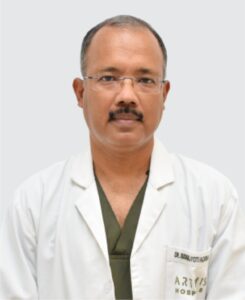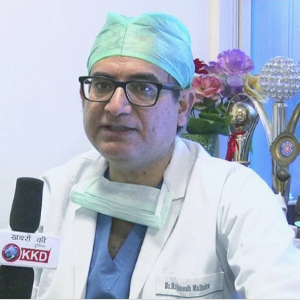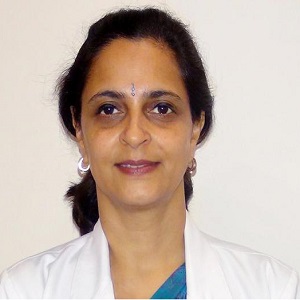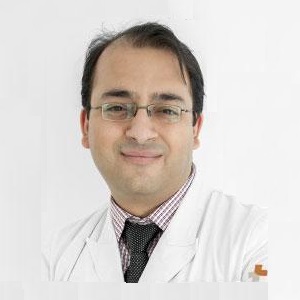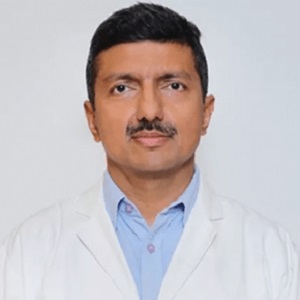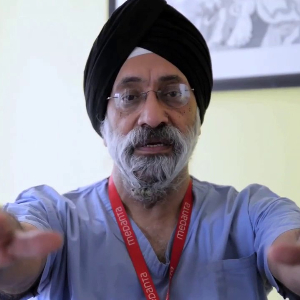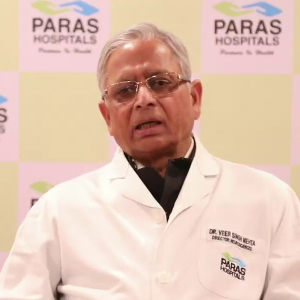Best Doctors in India for Alcoholic Hepatitis Treatment
- Oncologist | Chief - Head & Neck Surgery
- Over 20 Years' Experience
- Artemis Hospital, Gurgaon
Profile Highlights:
- Dr. Biswajyoti Hazarika, who is currently serving as the Chief of Head and Neck Surgery at Artemis Hospitals, is a Head & Neck Oncologist with an experience of over 20 years.
- His specialty lies in the surgical treatment of tumors and cancers affecting the head and neck region, which includes the parathyroid glands, salivary glands, thyroid, and the oral cavity, nose, and para-nasal sinuses.
- Dr. Hazarika is a skilled practitioner in his profession who is experienced in endoscopic and minimal access surgery in the head and neck region in addition to plastic reconstruction of the removed portion. Robotic Head & Neck Surgery is the most recent addition to his expertise.
- Top Cardio Thoracic & Vascular Surgeon | Max Hospital, Saket, New Delhi, India
- 31+ Years Experience
- Max Super Specialty Hospital, Saket, New Delhi
Profile Highlights:
- Dr. Rajneesh Malhotra is a distinguished cardiovascular and thoracic surgeon in India with over 31 years of experience.
- He is a prominent leader in the field of Cardiac Sciences and Cardiac Surgery (CTVS).
- Currently serving as the Vice Chairman and Head of CTVS at Max Healthcare, Dr. Malhotra has a robust background in both traditional and advanced cardiac surgical techniques.
- Top Ophthalmologist | Max Hospital, Saket. New Delhi, India
- 23+ Years Experience
- Max Super Specialty Hospital, Saket, New Delhi
Profile Highlights:
- Dr. Anita Sethi is a well-known eye surgeon in India with over 23 years of expertise in delivering comprehensive eye care.
- Specializing in Cataract and Refractive surgery, as well as all facets of Oculoplastic Surgery and Ocular Oncology, Dr. Sethi is recognized for her pioneering work in intraocular tumors and innovative treatments like Selective Intra-arterial Chemo (IAC) and Plaque brachy treatment, aimed at preserving vision.
- Dr. Sethi’s dedication extends to rehabilitating trauma cases, particularly war injuries and acid burn victims, reflecting her compassionate approach to patient care.
- Nephrologist, Gurugram, India
- Over 18 years’ experience
- Medanta-The Medicity, Gurgaon
Profile Highlights:
- Dr. Sidharth Kumar Sethi is a distinguished Senior Consultant in Pediatric Nephrology and Pediatric Renal Transplant Medicine at Medanta The Medicity, Gurugram, India.
- He holds a robust educational background with an M.B.B.S., M.D. in Pediatrics, and specialized Fellowships from the International Society of Nephrology and the International Pediatric Nephrology Association.
- Dr. Sethi’s clinical expertise spans a broad spectrum of renal care, including acute kidney injury, dialysis, and pediatric renal transplantation
- Top Ophthalmologist | Max Hospital, Saket, Gurugram, India
- 30+ Years Experience
- Max Super Specialty Hospital, Saket, New Delhi
Profile Highlights:
- Dr. Sanjay Dhawan is one of the best ophthalmologists in Gurugram. In 1998 he was appointed as Assistant Professor of Ophthalmology at Manipal College of Medical Sciences, Nepal, and associated Himalaya Eye Hospital, a project of FECH of The Netherlands.
- Dr. Dhawan was also among the first to popularize the technique of SICS for mass application in New Delhi, and he probably was also the first to introduce a modified Topical Anesthesia to perform SICS. The large-scale surgical experience helped him refine the surgeries of Phacoemulsification, MICS (Phakonit), LASIK, Supra-Whitnall’s Resection of LPS for Ptosis, etc.
- Top Bariatric & Laparoscopic Surgeon | Apollo Hospital, New Delhi, India
- 20+ Years Experience
- Indraprastha Apollo Hospital, New Delhi
Profile Highlights:
- With over 20 years of distinguished service, Dr. Aloy Jyoti Mukherjee stands out as a leading Bariatrician at Apollo Hospitals Indraprastha in New Delhi.
- Dr. Mukherjee’s educational foundation is robust, holding an MBBS and MS, and further complemented by prestigious certifications including MNAMS, FALS, FMAS, FIAGES, and specialized training in Robotic Surgery.
- Dr. Mukherjee provides comprehensive care for various conditions such as nonalcoholic fatty liver disease, sleep apnea, obesity management, and tailored weight loss coaching.
- Top Neurosurgeon | Medanta_ The Gurugram | India
- 30+ years’ experience
- Medanta-The Medicity, Gurgaon
Profile Highlights:
- Dr. V P Singh is a renowned Neurosurgeon with over 30 years of veteran experience. His competence in cranial, spinal, and peripheral nerves has helped him successfully perform 400+ Intracranial Aneurysm surgical procedures.
- Dr. Singh has also been credited for initiating the Gamma Knife Unit and epilepsy surgery program at All India Institute of Medical Sciences, New Delhi.
- He is proactively involved in the treatment of arteriovenous malformations by radiosurgery techniques and is currently the chairman of the Institute of Neurosciences, Medanta.
- Obstetrician & Gynaecologist, Gurugram, India
- Over 25 years’ experience
- Artemis Hospital, Gurgaon
Profile Highlights:
- Dr. Renu Raina Sehgal, Chairperson of the Department of Obstetrics & Gynaecology at Artemis Hospitals, Gurugram.
- She is a distinguished medical professional with over 25 years of experience in the field.
- Dr. Sehgal’s academic journey began with an MBBS from Ravindra Nath Tagore Medical College, Udaipur, followed by a postgraduate degree (DNB) in Obstetrics & Gynaecology from Sir Ganga Ram Hospital, New Delhi.
- Dermatologist, Gurugram, New Delhi, India
- 22 years’ experience
- Artemis Hospital, Gurgaon
Profile Highlights:
- Dr. Monica Bambroo is a distinguished Dermatologist with over 22 years of experience. Dr. Bambroo is a committed professional, evidenced by her leadership role as the Head of the Department of Dermatology and Cosmetology at Artemis Hospital, Gurugram.
- Her academic journey began with an MBBS degree from Government Medical College, Jammu, followed by a post-graduation in Dermatology and Venereology from the prestigious King Edward Memorial Hospital and Seth Gordhandas Sunderdas Medical College, Mumbai.
- She is actively involved in several professional organizations, including the Indian Association of Dermatologists, Venereologists, and Leprologists (IADVL), the Cosmetic Society of India (CSI), and the European Academy of Dermatology and Venereology (EADV).
- Neurosurgeon, Gurugram, India
- Over 38 years’ experience
- Paras Hospital Gurugram
Profile Highlights:
- Dr. (Prof.) V S Mehta is a leading Neurosurgeon in India and is considered among the best neurosurgeons in the world.
- He holds an experience of over 38 years in the field and is an expert in Brachial Plexus Surgery, Brain Stem Surgery, Brain Tumour
- He has been honored with the Padma Shri for his dedication and contributions to neurosurgery and spine surgery in India.
- In Paras Dr. V S Mehta has been part of the team to first use the Image-Guided Brain Tumor Navigation Technology for Brain tumor surgery in India.
Best Hospitals in India for Alcoholic Hepatitis Treatment
ALCOHOLIC HEPATITIS
Alcoholic hepatitis is a liver infection, which is mainly caused by frequent, heavy use of alcohol. Fat can build up in the liver cells, which might lead to inflammation as well as scarring of the liver.
Alcoholic hepatitis might be mild or severe. A patient might even need a liver transplant if proper treatment is not provided, or if they don’t stop consumption of alcohol.
It is also notable that all heavy drinkers don’t develop this condition, and sometimes this condition even develops in people who drink moderately. However, if you are diagnosed with this condition, it is important for you to quit drinking alcohol. People who continue drinking alcohol might face a huge risk of serious liver damage as well as death.
Symptoms
Depending on the amount of damage to the liver, the symptoms can vary. If you are having a mild form of the disease, you might not even experience any symptoms at all. However, as the damage continues to grow, you might experience the following:
- Changes in appetite
- Dry mouth
- Weight loss
- Pain or swelling in the abdomen
- Jaundice, or yellowing of the skin or eyes
- Fever
- Nausea and vomiting
- Easy bleeding or bruising
- Changes in your mental state, including confusion
- Fatigue
The symptoms of this condition are similar to those caused by a few other health conditions. Therefore, if you develop any of these symptoms, it is best to get a proper diagnosis as well as begin treatment.
Causes & risk factors
Alcoholic hepatitis generally develops when the alcohol you drink causes damage to your liver. However, it is not clear why alcohol does this damages only to some heavy drinkers.
Few factors that are known to play a role in this condition include:
- The body’s process that breaks down alcohol produces some toxic chemicals
- These chemicals can trigger inflammation that can destroy the liver cells
- Thus, over time, scars replace healthy liver tissue, thus interfering with the function of the liver
- This irreversible scarring, which is also termed cirrhosis, is the final stage of alcoholic liver disease
If you have hepatitis C and continue to drink, even moderately, you are more likely to develop cirrhosis.
Some heavy drinkers are also malnourished because they don’t eat a proper balanced diet. Alcohol and its byproducts also prevent the body from absorbing nutrition properly. Lack of nutrition can contribute to liver cell damage.
Some other risk factors that can lead to this condition include:
- Your sex- Women are usually at a higher risk of developing alcoholic hepatitis since the way alcohol is processed in women is different.
- Binge drinking- Having over five drinks within two hours for men and four or more for women can increase the risk of alcoholic hepatitis.
- Obesity- Heavy drinkers who are overweight are also more likely to develop alcoholic hepatitis and to progress from that condition to cirrhosis.
- Race and ethnicity- Hispanic and Negroid people might be at higher risk of alcoholic hepatitis.
- Genetic factors- According to studies, there may be a genetic component in alcohol-induced liver disease. However, it is difficult to separate genetic and environmental factors.
Diagnosis
If you are showing symptoms of alcoholic hepatitis, your doctor will first inquire about your medical history and alcohol consumption. Next, he/she will perform a physical exam to see if you have an enlarged liver or spleen. They might also need a few more tests to confirm your diagnosis, such as:
- Complete blood count (CBC)
- Liver function test
- Ultrasound of the liver
- Abdominal CT scan
- Blood clotting tests
In some cases, a liver biopsy might also be needed to confirm the diagnosis of alcoholic hepatitis. A liver biopsy requires your doctor to remove a tissue sample from your liver, which is then tested in the lab. This method helps to show the severity and type of liver disease.
Treatment
Stopping alcohol consumption is the most important treatment for alcoholic hepatitis. There is no cure for this condition, but treatment can help in reducing or eliminating symptoms, or stopping its progression.
It is also important to note that scarring of the liver is permanent, but treatment can aim to restore as much function as possible.
Dietary changes
Medication
Liver transplant
The best hope of recovery is to be aware of the signs and symptoms as well as to reduce, manage, or if possible, completely stop consumption of alcohol.
Complications
Alcoholic hepatitis might lead to severe other complications such as:
- Enlarged veins (varices)- In this condition, blood that is unable to flow freely through the portal vein, can back up into other blood vessels in your esophagus or stomach.
- Hepatic encephalopathy- This condition can be caused by the buildup of toxins if your damaged liver is unable to remove all the toxins from your body. It involves confusion, drowsiness, and slurred speech.
- Ascites- Ascites is a condition in which the fluid that accumulates in the abdomen may get infected and thus, require treatment with antibiotics. Although this condition is not life-threatening, it can be a sign of advanced alcoholic hepatitis, or cirrhosis.
- Kidney failure- A damaged liver affects blood flow to the kidneys, thus resulting in kidney failure.
- Cirrhosis- The scarring of the liver might lead to liver failure.
Prevention
Alcoholic hepatitis might be prevented if you take the following steps:
- Drink alcohol in moderation, if at all- For healthy adults, moderate drinking means no more than one drink a day for women of all ages and men older than 65, and not over two drinks a day for men aged 65 and younger. However, if you prevent all alcohol, it is a certain way to prevent this condition.
- Check before mixing medications and alcohol- Ask your doctor if it’s safe to drink alcohol while you are taking medications. Consider reading the warning labels on over-the-counter medications as well. Don’t drink alcohol when you are taking medications that warn of complications when combined with alcohol.
- Protect yourself from hepatitis C- Hepatitis C is an infectious liver disease that is caused by a virus. If it is left untreated, it may lead to cirrhosis. If you are having hepatitis C and you consume alcohol, you’re generally more likely to develop cirrhosis than if you don’t drink.

